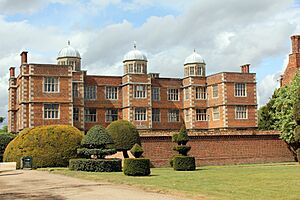Doddington Hall, Lincolnshire facts for kids
Quick facts for kids Doddington Hall |
|
|---|---|

Doddington Hall
|
|
| Type | Prodigy house |
| Location | Doddington, Lincolnshire |
| Built | 1595–1600 |
| Built for | Thomas Tailor |
| Architect | Robert Smythson |
| Architectural style(s) | Elizabethan |
| Owner | Claire & James Birch |
| Website | doddingtonhall.com |
|
Listed Building – Grade I
|
|
| Official name: Doddington Hall | |
| Designated | 22 December 1983 |
| Reference no. | 1164612 |
|
Listed Building – Grade II*
|
|
| Official name: Gatehouse to Doddington Hall | |
| Designated | 22 December 1983 |
| Reference no. | 1360505 |
|
Listed Building – Grade II*
|
|
| Official name: Walls and Gates to Doddington Hall | |
| Designated | 22 December 1983 |
| Reference no. | 1061959 |
| Official name: Doddington Hall | |
| Designated | 24 June 1985 |
| Reference no. | 1000975 |
| Reference no. | [1] |
| Lua error in Module:Location_map at line 420: attempt to index field 'wikibase' (a nil value). | |
Doddington Hall is a beautiful old house in Lincolnshire, England. It looks like a grand Elizabethan mansion from the outside. It has tall walls around its courtyards and a special gatehouse. Inside, the house was updated a lot in the 1760s. You can find it in the village of Doddington, which is west of the city of Lincoln.
Contents
History of Doddington Hall
Building the Hall
Doddington Hall was built a long time ago, between 1595 and 1600. A famous architect named Robert Smythson designed it. It was built for Thomas Tailor, who was a lawyer. The house is very wide from the front, but it's only one room deep in the middle.
Doddington Hall is a "Grade I listed building." This means it's a very important historic building in England. It is protected so it can be kept safe for many years.
Who Lived Here?
The land where Doddington Hall stands has a long history. In the 12th century, the Pigot family owned the area. Over time, the land was sold to different families. In 1593, Thomas Tailor bought the manor house and decided to build the amazing hall we see today.
After Thomas Tailor, his son inherited the hall. Then, his granddaughter Elizabeth Anton took over. She married Sir Edward Hussey. Their son, Sir Thomas Hussey, became the owner in 1658.
Later, the hall passed to Mrs. Sarah Apreece. When she passed away in 1749, her daughter Rhoda inherited it. Rhoda was married to Captain Francis Blake Delaval. Their son, Sir John Hussey-Delaval, then owned the hall. He made many improvements to the house in 1761.
The hall continued to be passed down through families. In 1829, it went to Lieutenant Colonel George Jarvis. After him, his cousin, the Rev Robert Eden Cole, became the owner. Doddington Hall is still owned by a private family today. In the mid-1900s, the hall was carefully restored by Laurence Bond and Francis Johnson.
Inside the Hall
The hall is full of amazing things from over 400 years. You can see old textiles, beautiful dishes, furniture, and paintings. These items show how families lived there for many generations.
In 1762, Sir John Hussey Delaval decorated a room called the Holly Room. He covered almost every part of it with special tapestries. These tapestries showed scenes of the countryside. They were made in Flanders in the early 1600s.
Visiting Doddington Hall
Today, Doddington Hall and its beautiful gardens are open to visitors. The gardens are about 6 acres (24,000 m2) in size. They have flowers blooming from early spring all the way until autumn. There is even a special temple in the gardens, built in 1973.
The gardens also host outdoor plays and art shows. The estate has grown to include other businesses. There's a farm shop, a home store, and a country clothing shop. You can also find a bicycle shop, two cafés, a tea room, and a restaurant. They even have holiday cottages, host weddings, and sell Christmas trees!
Ghost Stories
Some people believe Doddington Hall might be haunted! A writer named Daniel Codd wrote about it in his book Haunted Lincolnshire.
Historic Gardens
The parkland and gardens at Doddington Hall are also very important. They are listed as Grade II* on the Register of Historic Parks and Gardens. This means they are special and protected for their historical importance.
Gallery
Exterior Views
Inside the Hall
Gardens and Grounds
 | Ernest Everett Just |
 | Mary Jackson |
 | Emmett Chappelle |
 | Marie Maynard Daly |









